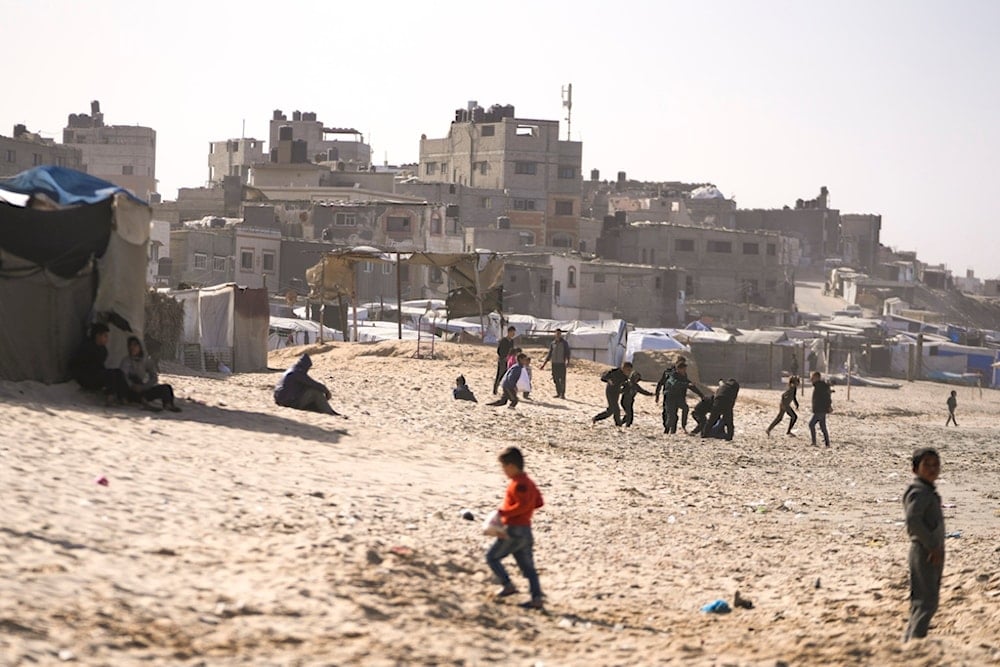Hamas says 'Israel' refusing to provide withdrawal maps, adding terms
Palestinian Resistance movement Hamas says the Israeli occupation is refusing to provide clear maps showing their withdrawal and is continuing to add terms to the ceasefire accord.
-

Children play on the sand in a camp for internally displaced Palestinians at the beachfront in Deir al-Balah, central Gaza Strip, on December 27, 2024 (AP)
The Israeli occupation is refusing to provide a definitive timeline or maps for the withdrawal of its troops from the Gaza Strip, Hamas political bureau member Basem Naim said Sunday.
Speaking to RIA Novosti, Naim stated, "This time, the enemy [Israel] refuses to provide clear withdrawal maps from the Gaza Strip, that is, it does not want to enshrine where and when it will pull out. It is unwilling to give clear and final words about ending the war."
On Wednesday, Hamas reported that Israel had introduced "new conditions" related to the withdrawal of troops, a ceasefire, and the exchange of prisoners. This development marks another roadblock in the negotiations mediated by intermediaries in Cairo and Doha.
In a separate statement, Naim clarified that the issue of weapons held by Palestinian resistance groups has not been discussed during the ongoing ceasefire talks. "This issue is not on the negotiating table regarding the first phase of the ceasefire. Our stance, both in these negotiations and in others, is that the Palestinian people, as long as they are under occupation, have the right to get rid of the occupation and establish their own state. They have the right to resist this occupation by all legitimate means, including armed resistance," he said.
More than a year has elapsed since the initial captive deal between the Israeli occupation and Hamas was implemented. Since then, both parties have been involved in prolonged negotiations over the fate of the remaining hostages. Recent weeks have seen intensified discussions, with reports of progress being made.
Ceasefire possible
Hamas had affirmed earlier in the month the potential to reach a ceasefire in Gaza and a prisoner exchange agreement, provided that the Israeli occupation refrains from imposing new conditions that could hurdle the deal.
"Amid the serious and positive discussions taking place in Doha today under the auspices of our Qatari and Egyptian brothers, reaching a ceasefire and prisoner exchange agreement is possible if the occupation stops introducing new conditions," the movement said on Tuesday.
Meanwhile, Palestinian President Mahmoud Abbas headed directly to Egypt from the Vatican following an urgent invitation, according to Al Mayadeen's bureau chief in occupied Palestine.
Additionally, informed sources told Reuters that "a ceasefire agreement in Gaza is expected to be finalized in the coming days." The sources added that Israeli Prime Minister Benjamin Netanyahu is "on his way to Cairo for talks regarding a Gaza ceasefire." However, Netanyahu's spokesperson denied these claims, stating, "Contrary to the wave of rumors, Netanyahu is not in Cairo."
Pictures shared later in the day showed the Israeli premier in the occupied Syrian Golan Heights alongside Security Minister Israel Katz and Chief of Staff Herzi Halevi.
UNGA backs ceasefire
The UNGA endorsed resolutions Wednesday calling for an immediate ceasefire in Gaza and supporting the United Nations Agency for Palestinian Refugees (UNRWA), which "Israel" has sought to abolish.
"Israel" and the US voted against the resolutions. While Security Council resolutions are legally binding, UNGA resolutions are not, despite representing global opinion.
The resolution urged "an immediate, unconditional, and permanent ceasefire" and also called for "the immediate and unconditional release of all hostages."
Although non-binding, the resolution further demands "immediate access" to extensive humanitarian aid for Gaza's population, particularly in the heavily blockaded northern region.
Hamas welcomed the agreement, affirming that it had engaged with all decisions or initiatives aimed at achieving a ceasefire throughout the stages of this aggression.

 4 Min Read
4 Min Read








